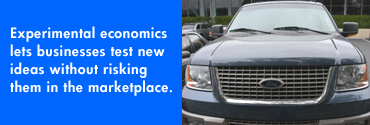
by Jamie Beckett
HP Labs experimental economists have helped HP improve revenue
forecasting and design new incentive programs for retailers,
and they've explored such questions as pricing contracts
and currency fluctuations.
They've also worked with partners like Ford Motor Co. on
a system its researchers developed for selling off-lease
cars that were returned to dealers.
In the past, Ford shipped these cars from dealer lots to
central locations to be sold at auction. After buying those
cars at auctions, dealers need to ship them back to their
lots.
Ford wondered what would happen if dealers could buy
those cars directly on their lots without going through the
auction process, saving both the time and expense required
to transport cars and auction them. What would dealers pay
for these cars? How would the company determine what price
to charge?
Ford researcher Suzhou Huang and his team in Ford Remarketing
had developed a pricing model based on the unique characteristics – factors
such as the equipment included, color, usage, location and
so on – of each individual vehicle.
Before implementing it, Huang wanted to test the team's
assumptions about dealer behavior that were used in constructing
the model. So he got together with Kay-Yut Chen, who heads
HP Labs' experimental economics program, which uses laboratory
experiments with human subjects to solve real business problems.
"The strength of Kay-Yut's lab is that it conducts
studies on how people behave," says Irv Salmeen, manager
of Ford Research's Infotronics and System Analytics Department.
Chen and Huang designed an experimental "game" that
mimicked decisions car dealers had to make, tested it in
Chen's lab and determined that the assumptions made by the
Ford Remarketing team were correct.
Ford implemented the program in 2004. Both Ford and its
dealers save time and money – and consumers win with
lower prices, Salmeen says.
The automaker is now exploring expanding the program to
include more used cars, such as off-rental cars. Encouraged
by the success of the collaboration, the team is also considering
a more comprehensive optimization of the entire remarketing
channel process.
Experimental economics, says Chen, lets businesses test
new ideas without risking them in the marketplace.
"We call this our wind tunnel for business," he
says.
Jamie Beckett is managing editor of the HP Labs Web site
and a veteran newspaper reporter and editor.
|
